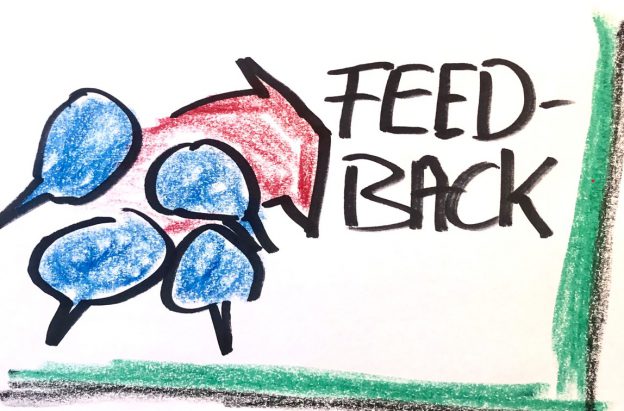
A tool for helpful feedback
Often, feedback givers and feedback takers in seminars and training sessions know little about each other. We don’t know what is helpful and what we should pay particular attention to. So why not ask the trainer and pre-structure observations and feedback in a short conversation beforehand?
Let’s take the training of negotiation strategies, presentation skills or moderation techniques as examples. Before the training begins, the trainer starts a short conversation, as informally as possible, for subsequent feedback. This is not very easy because the participants‘ minds are already on the performance.
Suggestions for this discussion:
- Would you like to have feedback afterwards or would you rather have a review for yourself?
- What do you want us to pay attention to?
- Is there anything you don’t want to hear because you’ve been told it so often (for example, you talk too fast!)?
- Choose three colleagues to give you feedback afterwards.
- The feedback for you: Verbal or briefly written on a card?
In order to keep the preliminary talk really short, one of these suggestions might be enough.
At the end of the interview, it must be clear to everyone involved how the feedback will be given.
The effect of this short preliminary talk: The feedback comes into focus on both sides: On the part of those giving feedback as well as on the part of those receiving it.
Interested in a full day on feedback?
There will be a seminar day on this topic in the Refak programme 2024:
May 7, 2024: Feedbacks. Tools, strategies and tips for the speaker’s everyday work.
Feedback rules in the pre-feedback talk?
For some colleagues, a preliminary feedback meeting (either before the practice session on which the feedback is given or immediately before the feedbacks) is also the place for feedback rules. I am torn about this. Since I assume that the basic rules are generally known, I do without them. I want to save time and avoid wasting energy. In the process, I am surprised time and again that people do talk about personality and make judgements instead of sticking to observed behaviour and its effects.
The preliminary feedback talk in small groups
One participant has finished their part. The peer feedback is about to start. Beforehand, the observers meet in small groups to discuss joint feedback, which is then presented by one person from the group. This avoids repetition and length. It is interesting to note that some behaviours (e.g. speed, use of dialect, media etc.) are sometimes perceived and evaluated differently. Even if clarity is lost as a result, it is good that such contradictory perceptions are addressed as such.
What does the person in question do during the preparation of the feedback in the small groups? Either taking a deep breath (sometimes this is good!) or receiving feedback from the trainer. The others will not hear this.
Before the final feedback
Feedback in a final round is also more meaningful if it is prepared in small groups. Five minutes is often enough. To make the work easier and prevent it from getting out of hand, the trainer can provide support. For example: „We are repeating the seminar. What should we definitely keep? What should we change?“ Or: „I often hear: You are erratic and the red thread is not always there. How did you perceive that? I would be specifically interested in that, in addition to the other observations.“
Author: Ulli Lipp
Translation: Astrid Donaubauer

Dieses Werk ist lizenziert unter einer Creative Commons Namensnennung-NichtKommerziell-Weitergabe unter gleichen Bedingungen unter gleichen Bedingungen 3.0 Österreich Lizenz.
Volltext der Lizenz

